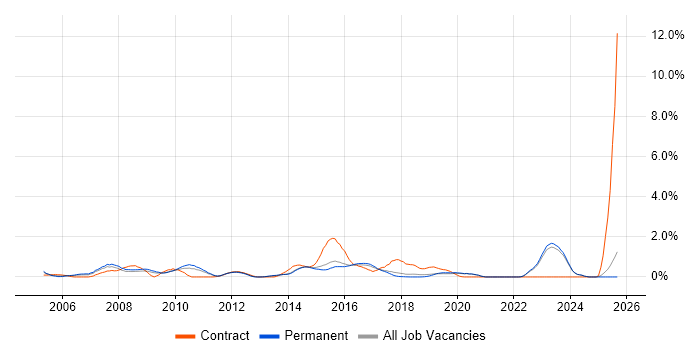Infrastructure Support
South East > East Sussex
The median Infrastructure Support daily rate in East Sussex is £170, according to job vacancies posted in the 6 months leading up to 1 October 2025.
The table below compares current contractor rates and summary statistics with the previous two years.
| 6 months to 1 Oct 2025 |
Same period 2024 | Same period 2023 | |
|---|---|---|---|
| Rank | 18 | - | - |
| Rank change year-on-year | - | - | - |
| Contract jobs requiring an Infrastructure Support | 2 | 0 | 0 |
| As % of all contract jobs in East Sussex | 1.79% | - | - |
| As % of the Job Titles category | 2.86% | - | - |
| Number of daily rates quoted | 2 | 0 | 0 |
| 10th Percentile | - | - | - |
| 25th Percentile | £160 | - | - |
| Median daily rate (50th Percentile) | £170 | - | - |
| 75th Percentile | £180 | - | - |
| 90th Percentile | - | - | - |
| South East median daily rate | £267 | £375 | £229 |
| % change year-on-year | -28.80% | +63.93% | -15.28% |
All Contract IT Job Vacancies
East Sussex
For comparison with the information above, the following table provides summary statistics for all contract IT job vacancies in East Sussex. Most job vacancies include a discernible job title that can be normalized. As such, the figures in the second row provide an indication of the number of contract jobs in our overall sample.
| Contract vacancies in East Sussex with a recognized job title | 70 | 67 | 101 |
| % of contract IT jobs with a recognized job title | 62.50% | 93.06% | 99.02% |
| Number of daily rates quoted | 40 | 41 | 55 |
| 10th Percentile | £160 | £308 | £388 |
| 25th Percentile | £290 | £380 | £419 |
| Median daily rate (50th Percentile) | £450 | £425 | £550 |
| Median % change year-on-year | +5.88% | -22.73% | +7.32% |
| 75th Percentile | £518 | £588 | £745 |
| 90th Percentile | £660 | £675 | - |
| South East median daily rate | £500 | £505 | £500 |
| % change year-on-year | -0.99% | +1.00% | - |
| Number of hourly rates quoted | 15 | 1 | 7 |
| 10th Percentile | - | - | £13.09 |
| 25th Percentile | £12.60 | £51.25 | £13.16 |
| Median hourly rate | £15.50 | £52.50 | £18.00 |
| Median % change year-on-year | -70.48% | +191.67% | +44.23% |
| 75th Percentile | £16.73 | £53.75 | £29.09 |
| 90th Percentile | £27.29 | - | £40.85 |
| South East median hourly rate | £25.15 | £58.49 | £51.90 |
| % change year-on-year | -57.00% | +12.70% | +110.93% |
Infrastructure Support
Job Vacancy Trend in East Sussex
Historical trend showing the proportion of contract IT job postings featuring 'Infrastructure Support' in the job title relative to all contract IT jobs advertised in East Sussex.

Infrastructure Support
Daily Rate Trend in East Sussex
Contractor daily rate distribution trend for Infrastructure Support job vacancies in East Sussex.

Infrastructure Support
Hourly Rate Trend in East Sussex
Contractor hourly rate distribution trend for Infrastructure Support job vacancies in East Sussex.

Infrastructure Support
Contract Job Locations in East Sussex
The table below looks at the demand and provides a guide to the median contractor rates quoted in IT jobs citing Infrastructure Support within the East Sussex region over the 6 months to 1 October 2025. The 'Rank Change' column provides an indication of the change in demand within each location based on the same 6 month period last year.
| Location | Rank Change on Same Period Last Year |
Matching Contract IT Job Ads |
Median Daily Rate Past 6 Months |
Median Daily Rate % Change on Same Period Last Year |
Live Jobs |
|---|---|---|---|---|---|
| Eastbourne | - | 2 | £170 | - | |
| Infrastructure Support South East |
|||||
Infrastructure Support Skill Set
Top 8 Co-Occurring Skills & Capabilities in East Sussex
For the 6 months to 1 October 2025, Infrastructure Support contract job roles required the following skills and capabilities in order of popularity. The figures indicate the absolute number of co-occurrences and as a proportion of all contract job ads across the East Sussex region featuring Infrastructure Support in the job title.
|
Infrastructure Support Skill Set
Co-Occurring Skills & Capabilities in East Sussex by Category
The following tables expand on the one above by listing co-occurrences grouped by category. They cover the same employment type, locality and period, with up to 20 co-occurrences shown in each category:
|
|
|||||||||||||||||||||
|
|
|||||||||||||||||||||
|
||||||||||||||||||||||
